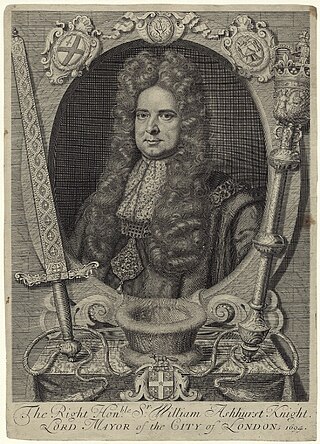
Jonathan Chapman was an American politician who served as the eighth mayor of Boston, Massachusetts from 1840 to 1842.

Benjamin Seaver was an American politician, serving as the thirteenth mayor of Boston, Massachusetts from January 5, 1852 to January 2, 1854.

Joseph Milner Wightman was an American politician who, from 1861 to 1863, served as the seventeenth Mayor of Boston, Massachusetts.

Thomas Aspinwall Davis was a silversmith and businessman who served as mayor of Boston for nine months in 1845.

Benson Leavitt was a Boston, Massachusetts, businessman, born in New Hampshire, who served as an Alderman of Boston, and later as acting mayor after the incumbent became incapacitated and died while in office.

Sir William Ashhurst was an English banker, merchant and Whig politician who sat in the English and British House of Commons from 1689 to 1710. He was also Lord Mayor of London in 1693.

The 1844 Chicago mayoral elections is the first of only two instances in which a Chicago mayoral election was declared invalid.
The Boston mayoral election of 1854 saw the reelection of incumbent mayor Jerome V. C. Smith. It was held on December 11, 1854.
The Boston mayoral election of 1858 saw the reelection of Frederic W. Lincoln Jr. It was held on December 13, 1858.
The Boston mayoral election of 1859 saw the reelection of Frederic W. Lincoln Jr. to a third consecutive term. It was held on December 12, 1859.
The Boston mayoral election of 1866 saw the election of Republican Party nominee Otis Norcross.
The Boston mayoral election of 1853–1854 saw the election of Citizens Union Party nominee Jerome V. C. Smith. The election took three votes, as no candidate secured the needed majority in the first two attempts. Incumbent Whig mayor Benjamin Seaver had run for reelection as his party's nominee in the first vote, but opted not to compete in the second or third votes.
The Boston mayoral election of 1852 saw the reelection of Benjamin Seaver to a second term. It was held on December 13, 1852.
The 1850 Boston mayoral election saw the reelection of incumbent Whig mayor John P. Bigelow to a third consecutive term. It was held on December 9, 1850.
The 1848 Boston mayoral election saw the election of Whig Party nominee John P. Bigelow. It was held on December 11, 1848. Incumbent Whig mayor Josiah Quincy Jr. was not a nominee for reelection.
The 1847 Boston mayoral election saw the reelection of Whig Party incumbent Josiah Quincy Jr. to a third consecutive term. It was held on December 13, 1847.
The 1846 Boston mayoral election saw the reelection of Whig Party incumbent Josiah Quincy Jr. It was held on December 14, 1846.
The December 1845 Boston mayoral election saw the election of Whig Party nominee Josiah Quincy Jr. It was held on December 8, 1845.
The 1844–45 Boston mayoral election saw the election of Native American Party nominee Thomas Aspinwall Davis as mayor of Boston. The election took eight votes, as no candidate secured the needed majority in the first seven attempts. Incumbent Whig Party mayor Martin Brimmer was not a nominee reelection.












